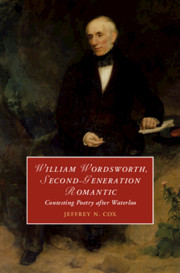Book contents
- William Wordsworth, Second-Generation Romantic
- Cambridge Studies in Romanticism
- William Wordsworth, Second-Generation Romantic
- Copyright page
- Dedication
- Contents
- Figures
- Acknowledgments
- Abbreviations
- Introduction
- Chapter 1 Cockney Excursions
- Chapter 2 Wordsworth’s “Thanksgiving Ode”
- Chapter 3 “This Potter-Don-Juan”
- Chapter 4 Thinking Rivers
- Chapter 5 Late “Late Wordsworth”
- Postscript Wordsworth in 1850
- Notes
- Select Bibliography
- Index
- Cambridge Studies in Romanticism
Chapter 3 - “This Potter-Don-Juan”
Peter Bell in 1819
Published online by Cambridge University Press: 10 June 2021
- William Wordsworth, Second-Generation Romantic
- Cambridge Studies in Romanticism
- William Wordsworth, Second-Generation Romantic
- Copyright page
- Dedication
- Contents
- Figures
- Acknowledgments
- Abbreviations
- Introduction
- Chapter 1 Cockney Excursions
- Chapter 2 Wordsworth’s “Thanksgiving Ode”
- Chapter 3 “This Potter-Don-Juan”
- Chapter 4 Thinking Rivers
- Chapter 5 Late “Late Wordsworth”
- Postscript Wordsworth in 1850
- Notes
- Select Bibliography
- Index
- Cambridge Studies in Romanticism
Summary
While written in the 1790s, Wordsworth’s Peter Bell was only published in 1819 as part of his effort to contest the dominance of Scott and Byron in narrative poetry. As contemporary responses make clear, the poem could be read as a rebuke to Byron’s celebration of villain-heroes: what came to be known as Byronic heroes, morally mixed but charismatic men. Wordsworth’s earlier participation in a collective satire on Byron suggests how Peter Bell responds to Byron and helps make sense of the ways in which Byron, Shelley, and Hunt saw the poem as a rejection of their ongoing work. While Wordsworth offered the poem as an example of the ways in which natural experiences can lead to spiritual reform, his turn to a Methodist preacher at the climax of the poem enraged his younger contemporaries, who saw Methodism as a key force in reactionary culture. In Shelley’s The Witch of Atlas and Peter Bell the Third, in Byron’s Don Juan, and in satires and reviews of Peter Bell and related works by Keats, Reynolds, and Hunt we see a collective attempt by the Cockney School to answer the challenge they heard in Peter Bell.
- Type
- Chapter
- Information
- William Wordsworth, Second-Generation RomanticContesting Poetry after Waterloo, pp. 110 - 128Publisher: Cambridge University PressPrint publication year: 2021

